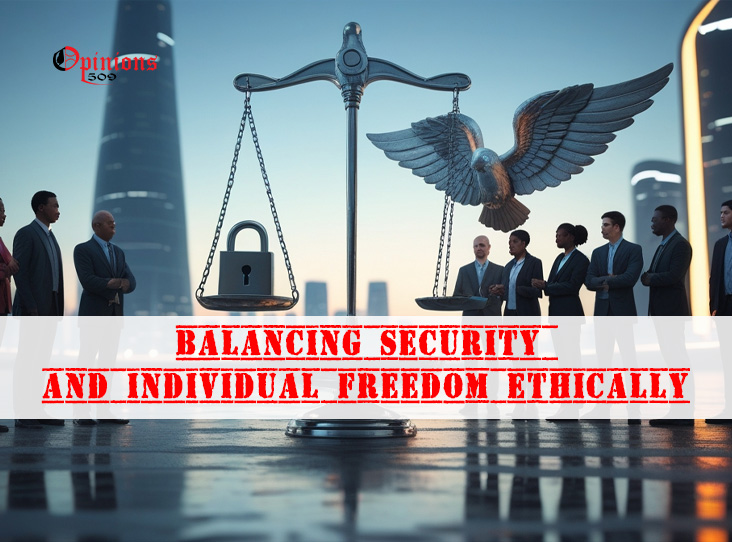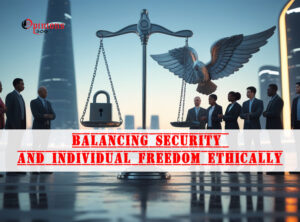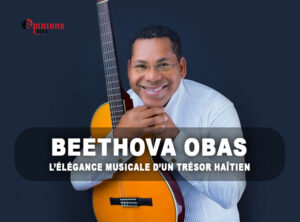The balance between security and individual freedom is a complex and dynamic interplay that involves ethical, legal, philosophical, and practical considerations. Here’s a structured analysis of the key aspects:
Table of Contents
- 1 1. Historical and Contemporary Examples
- 2 2. Philosophical Foundations
- 3 Case Study: Pandemic Lockdowns and Public Health Mandates
- 4 Hobbesian Perspective
- 5 Rousseauian Perspective
- 6 Case Examples
- 7 Analysis: Hobbes vs. Rousseau
- 8 Key Takeaways
- 9 3. Technological and Legal Dimensions
- 10 4. Cultural and Contextual Variations
- 11 5. Effectiveness and Accountability
- 12 6. Guiding Principles
- 13 Conclusion
- 14 Author
1. Historical and Contemporary Examples
- Post-9/11 Surveillance: The U.S. Patriot Act expanded government surveillance to combat terrorism, sparking debates over privacy versus safety. While effective in some security efforts, it raised concerns about overreach and erosion of civil liberties.
- Public Health Measures: COVID-19 lockdowns and mandates highlighted tensions between collective safety and personal freedoms, illustrating how crisis responses can test societal tolerance for restrictions.
- Encryption Debates: Governments seeking access to encrypted data for crime prevention clash with tech advocates who argue that backdoors undermine global digital security and privacy.
2. Philosophical Foundations
- John Stuart Mill’s Harm Principle: Restricting freedom is only justified to prevent harm to others, though “harm” remains subjectively defined.
- Hobbes vs. Rousseau: Hobbes’ advocacy for a strong sovereign to ensure order contrasts with Rousseau’s social contract, where citizens consent to limited freedoms for communal benefits.
Here’s a case study comparing Thomas Hobbes and Jean-Jacques Rousseau in the context of a modern security-vs-freedom dilemma, using the COVID-19 pandemic as a framework. This scenario highlights their contrasting views on human nature, governance, and the role of the state in balancing collective security with individual liberty.
Case Study: Pandemic Lockdowns and Public Health Mandates
Scenario: A global pandemic threatens public health. Governments must decide whether to impose strict lockdowns, mask mandates, and vaccine requirements to protect citizens or prioritize individual freedoms by allowing people to make personal choices.
Hobbesian Perspective
Core Philosophy:
Hobbes argued that humans are inherently self-interested and prone to conflict in the “state of nature.” To avoid chaos, people must surrender some freedoms to an absolute sovereign (Leviathan) in exchange for security and order.
Application to the Pandemic:
- Justification for Authoritative Measures:
- Hobbes would support strict lockdowns and mandates as necessary to prevent societal collapse. Without enforced rules, individuals might act selfishly (e.g., refusing masks or vaccines), worsening the crisis.
- Example: China’s “Zero-COVID” policy, which used draconian lockdowns and surveillance to suppress outbreaks.
- Role of the State:
- The state must act decisively to protect the “common good,” even if it limits freedoms. Security trumps liberty in existential threats.
- Hobbes might criticize democracies for prioritizing individual rights over collective survival during the pandemic.
- Critique of Individualism:
- Without coercion, voluntary compliance would fail, leading to a “war of all against all” (e.g., overwhelmed hospitals, economic collapse).
Rousseauian Perspective
Core Philosophy:
Rousseau believed humans are naturally compassionate but corrupted by society. He advocated for a social contract where individuals voluntarily surrender some freedoms to a government that reflects the “general will” (common good), while retaining sovereignty.
Application to the Pandemic:
- Emphasis on Collective Responsibility:
- Rousseau would favor policies that encourage voluntary cooperation (e.g., public education campaigns) over coercion. Trust in people’s innate sense of community could lead to compliance without heavy-handed enforcement.
- Example: Sweden’s initial strategy of relying on voluntary social distancing rather than mandates.
- Distrust of Authoritarianism:
- Rousseau would warn against centralized power eroding trust and fostering resentment. Excessive mandates (e.g., prolonged lockdowns) could violate the social contract and provoke civil disobedience.
- Example: Protests in democracies like the U.S. and Europe against perceived government overreach.
- Balancing Freedom and Equity:
- Policies must address systemic inequalities (e.g., low-income workers unable to isolate) to ensure the “general will” protects all citizens, not just elites.
Case Examples
- China (Hobbesian Approach):
- Strict lockdowns, digital surveillance (e.g., health code apps), and centralized enforcement.
- Outcome: Reduced COVID deaths but sparked public unrest over lost freedoms and economic hardship.
- Sweden (Rousseauian Approach):
- No lockdowns; relied on public trust and personal responsibility.
- Outcome: Higher initial death rates but preserved economic activity and social cohesion.
- United States (Mixed Approach):
- Varied state-level mandates (e.g., mask laws, vaccine passports) and fierce debates over federal vs. individual rights.
- Outcome: Political polarization, distrust in institutions, and uneven public health outcomes.
Analysis: Hobbes vs. Rousseau
| Aspect | Hobbes | Rousseau |
|---|---|---|
| Human Nature | Selfish, requiring control | Naturally cooperative, corrupted by systems |
| Role of Government | Absolute authority to enforce security | Facilitator of the “general will” |
| Freedom vs. Security | Security justifies limiting freedom | Freedom must align with collective good |
| Pandemic Response | Mandates and surveillance | Education, equity, and voluntary action |
Key Takeaways
- Effectiveness vs. Freedom: Hobbesian measures may save lives but risk authoritarianism; Rousseauian approaches prioritize trust but depend on societal cohesion.
- Context Matters: In crises, societies with low trust (e.g., fragmented democracies) may lean Hobbesian, while cohesive communities might adopt Rousseauian strategies.
- Ethical Middle Ground: Modern democracies often blend both philosophies:
- Example: The UK’s NHS COVID Pass balanced mandates with sunset clauses and parliamentary oversight.
The pandemic illustrates the enduring relevance of Hobbes and Rousseau. Hobbes warns of chaos without strong governance, while Rousseau cautions against sacrificing liberty and trust for security. A just balance requires transparency, proportionality, and mechanisms to ensure state power serves not subverts the people. Neither philosopher’s vision is perfect, but their ideas remain critical for navigating crises where security and freedom collide.
3. Technological and Legal Dimensions
- Surveillance Technologies: Tools like facial recognition and data tracking enhance security but risk normalizing a surveillance state, as seen in China’s Social Credit System.
- Legal Frameworks: Courts often arbitrate security measures against constitutional rights (e.g., wiretapping cases). Regulations like the EU’s GDPR aim to protect privacy while permitting necessary oversight.
4. Cultural and Contextual Variations
- Societies differ in prioritizing security versus liberty. Authoritarian regimes may emphasize control, while democracies often grapple with balancing rights and safety, reflecting diverse values and historical experiences.
5. Effectiveness and Accountability
- Proportionality: Security measures must demonstrably enhance safety to justify curtailing freedoms. Ineffective policies (e.g., criticized TSA procedures) undermine public trust.
- Oversight Mechanisms: Transparency and accountability (e.g., judicial review, independent audits) are crucial to prevent abuse of power, especially in democracies.
6. Guiding Principles
- Necessity and Proportionality: Measures should be the least intrusive means to achieve security goals.
- Dynamic Balance: The equilibrium shifts with emerging threats, technological advancements, and evolving societal values, requiring ongoing dialogue and adaptation.
Conclusion
The balance between security and freedom is not static but a continuous negotiation. It demands careful consideration of ethical imperatives, empirical effectiveness, and institutional safeguards to protect both communal safety and individual rights. A just society strives to minimize harm while upholding democratic principles, ensuring neither security nor freedom is disproportionately sacrificed.
Author
Stay connected for new publications, events, and more.






More Stories
La Constitution de 1987 : Un Pilier de Démocratie et d’Esprit Haïtien
Exploring the Concept of God Across Cultures
Hommage à Beethova Obas : L’Élégance Musicale d’un Trésor Haïtien